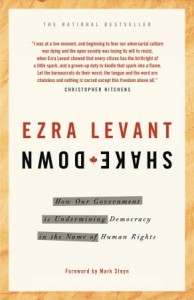 In 2006, Canadian journalist Ezra Levant republished the controversial Danish cartoons depicting the Muslim prophet Muhammad in his journal, the Western Standard. He was the only Canadian journalist to do so, and this meager stand for journalistic integrity promptly earned him the ire of Alberta’s Human Rights Commission and the nebulous accusation of “discrimination.” The entire 90-minute interrogation that followed is available on YouTube, and is worth a watch, if only because it offers disturbing insights into what has become a tyrannical government branch operating without any real oversight and imbued with extralegal powers. These indictments deserve to be expanded upon, and Levant does an admirable job of this, but the short list of violations include the right to face your accused and the right to a speedy trial. That second one, in particular, is no small deal, especially when you’re paying for your legal expenses out of pocket while your accused’s are taxpayer-subsidized. Many individuals and small business owners, intimidated by the extravagant legal fees required to fight a protracted “trial,” simply settle and admit guilt, regardless of actual wrongdoing.
In 2006, Canadian journalist Ezra Levant republished the controversial Danish cartoons depicting the Muslim prophet Muhammad in his journal, the Western Standard. He was the only Canadian journalist to do so, and this meager stand for journalistic integrity promptly earned him the ire of Alberta’s Human Rights Commission and the nebulous accusation of “discrimination.” The entire 90-minute interrogation that followed is available on YouTube, and is worth a watch, if only because it offers disturbing insights into what has become a tyrannical government branch operating without any real oversight and imbued with extralegal powers. These indictments deserve to be expanded upon, and Levant does an admirable job of this, but the short list of violations include the right to face your accused and the right to a speedy trial. That second one, in particular, is no small deal, especially when you’re paying for your legal expenses out of pocket while your accused’s are taxpayer-subsidized. Many individuals and small business owners, intimidated by the extravagant legal fees required to fight a protracted “trial,” simply settle and admit guilt, regardless of actual wrongdoing.
But perhaps the best indictment of these glorified star chambers comes from their own judgments. It is difficult to see how the cause of human rights is advanced when McDonald’s is issued a $50,000 fine for firing an employee who refused to wash her hands as often as company policy required, or when a rape shelter is charged with discrimination and faced with over $100,000 in legal fees for their policy of allowing only women to provide psychological counseling for female rape victims. Yet another example is furnished by the owner of a bar, who was charged with “discrimination against a disabled person” for asking a medical marijuana smoker not to indulge on his premises, as per the requests of his other patrons.
Still, the most offensive examples, and the most pernicious, have to do with the presumptuousness of these committees in their attempts to regulate the speech and conscience of Canadian citizens. It is no one’s right to tell me what to say or think, and every citizen of Canada has an equal and inalienable claim to this fundamental freedom. “Let the bureaucrats do their worst,” wrote Christopher Hitchens, in his review of this same book, “the tongue and the word are chainless and nothing is sacred except this freedom above all.”
Restrain the right to free expression and you neuter the citizenry and accustom them to letting others do their thinking for them. This is indeed, as Levant’s subtitle has it, an undermining of democracy, a direct threat to our most sacred and hard-won ideals as a society. And this little book, and the debate it ignited, is nothing if not a testament to the revolutionary power of ideas.